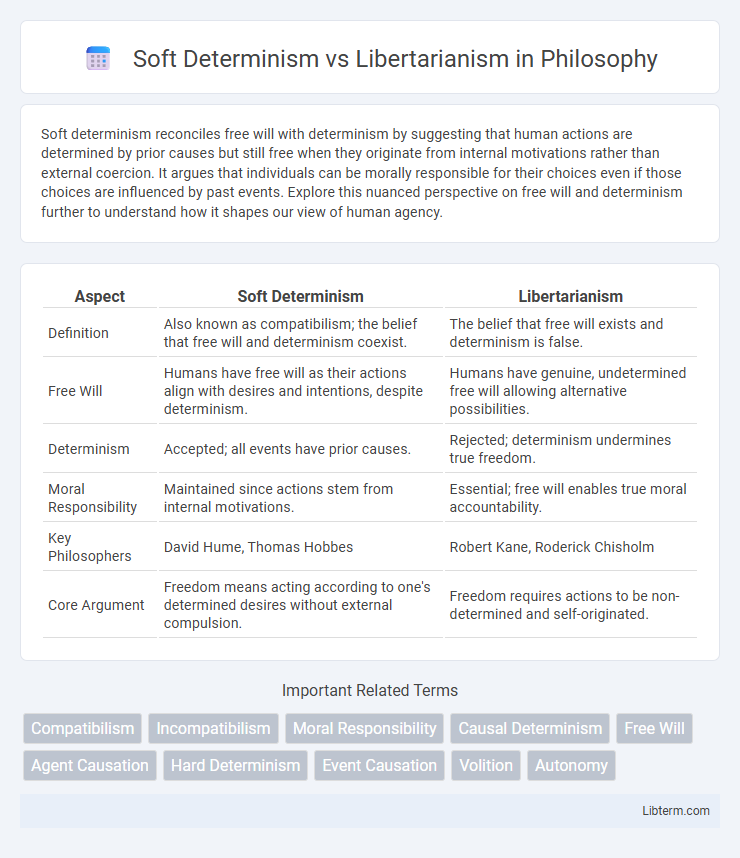Soft determinism reconciles free will with determinism by suggesting that human actions are determined by prior causes but still free when they originate from internal motivations rather than external coercion. It argues that individuals can be morally responsible for their choices even if those choices are influenced by past events. Explore this nuanced perspective on free will and determinism further to understand how it shapes our view of human agency.
Table of Comparison
| Aspect | Soft Determinism | Libertarianism |
|---|---|---|
| Definition | Also known as compatibilism; the belief that free will and determinism coexist. | The belief that free will exists and determinism is false. |
| Free Will | Humans have free will as their actions align with desires and intentions, despite determinism. | Humans have genuine, undetermined free will allowing alternative possibilities. |
| Determinism | Accepted; all events have prior causes. | Rejected; determinism undermines true freedom. |
| Moral Responsibility | Maintained since actions stem from internal motivations. | Essential; free will enables true moral accountability. |
| Key Philosophers | David Hume, Thomas Hobbes | Robert Kane, Roderick Chisholm |
| Core Argument | Freedom means acting according to one's determined desires without external compulsion. | Freedom requires actions to be non-determined and self-originated. |
Introduction to Free Will and Determinism
Soft determinism, also known as compatibilism, argues that free will and determinism coexist, asserting that individuals can make voluntary choices even if their actions are causally determined by prior events. Libertarianism maintains that free will is incompatible with determinism, emphasizing that humans possess genuine freedom to choose independent of predetermining factors. The debate between these positions centers on how free will is defined and whether determinism necessarily negates personal autonomy and moral responsibility.
Defining Soft Determinism
Soft Determinism, also known as compatibilism, defines free will as the ability to act according to one's desires and intentions without external coercion, even though these desires are determined by prior causes. It reconciles determinism with moral responsibility by asserting that freedom is compatible with causally determined actions. This contrasts with Libertarianism, which argues that free will occurs only if determinism is false, emphasizing genuine indeterminism and agent causation.
Understanding Libertarianism in Philosophy
Libertarianism in philosophy asserts that individuals possess free will that is fundamentally incompatible with determinism, emphasizing moral responsibility through genuine alternative possibilities. This view argues that human actions are not predetermined by prior states or causal chains, allowing for autonomous decision-making. Key figures like Robert Kane highlight the significance of agent causation in affirming libertarian free will against deterministic frameworks.
Key Differences Between Soft Determinism and Libertarianism
Soft determinism asserts that free will is compatible with determinism, meaning human actions are determined but still free if they align with internal desires and intentions. Libertarianism rejects determinism, arguing that individuals possess genuine free will that is not causally determined by prior events. The key difference lies in whether free will requires indeterminism (libertarianism) or can exist within deterministic frameworks (soft determinism).
Historical Background and Major Thinkers
Soft determinism, also known as compatibilism, traces its roots to thinkers like David Hume and Thomas Hobbes, who argued that free will and determinism can coexist without contradiction. Libertarianism in philosophy, distinct from political usage, gained prominence with Immanuel Kant and later 20th-century philosophers such as Robert Kane, emphasizing genuine free will as incompatible with determinism. These major thinkers shaped debates on moral responsibility by addressing whether human actions are predetermined or freely chosen.
Philosophical Arguments for Soft Determinism
Soft determinism argues that free will and determinism coexist through the concept of compatibilism, positing that human actions are determined by prior causes yet remain free when aligned with internal desires and intentions. Philosophical arguments emphasize that moral responsibility persists because voluntary actions stem from internal psychological states rather than external constraints. Key proponents like David Hume and Daniel Dennett assert that understanding freedom as freedom from coercion, not metaphysical indeterminacy, grounds ethical accountability within a deterministic framework.
Core Principles of Libertarian Free Will
Libertarian free will asserts that individuals possess genuine alternative possibilities and the capacity to make undetermined choices, emphasizing personal responsibility and moral agency. Unlike soft determinism, which reconciles free will with causal determinism, libertarianism rejects determinism entirely, maintaining that free will is incompatible with any predetermined causal chain. This core principle underlines the belief that human actions are not preordained and that agents can initiate new causal sequences through conscious decisions.
Criticisms of Soft Determinism
Soft determinism faces criticism for its attempt to reconcile determinism with free will, which some argue creates a contradictory framework that fails to fully account for genuine freedom of choice. Critics claim that soft determinism's reliance on the principle of alternative possibilities is flawed, as it restricts moral responsibility to actions determined by internal states rather than true libertarian free will. Empirical studies in neuroscience and psychology often challenge soft determinism by demonstrating that unconscious brain processes influence decisions before conscious awareness, undermining the notion of autonomous, self-determined action.
Challenges to Libertarianism
Libertarianism faces challenges related to the concept of free will under physical causality, as critics argue that the assumption of agent causation conflicts with established scientific principles such as determinism and the conservation of energy. The difficulty of explaining how free will can exert causal influence without violating natural laws raises fundamental questions about the coherence of libertarian claims. Furthermore, empirical studies in neuroscience suggest that unconscious brain activity precedes conscious decision-making, undermining the libertarian notion of uncaused, deliberate choice.
Contemporary Relevance and Ongoing Debates
Soft determinism remains relevant in contemporary philosophy by addressing the compatibility between free will and causal determinism, influencing debates on moral responsibility and legal accountability. Libertarianism challenges deterministic frameworks by asserting genuine free will, fueling ongoing discussions in neuroscience, ethics, and quantum mechanics about human agency. Both positions continue to shape interdisciplinary dialogues on personal autonomy and the limits of scientific explanation.
Soft Determinism Infographic

 libterm.com
libterm.com